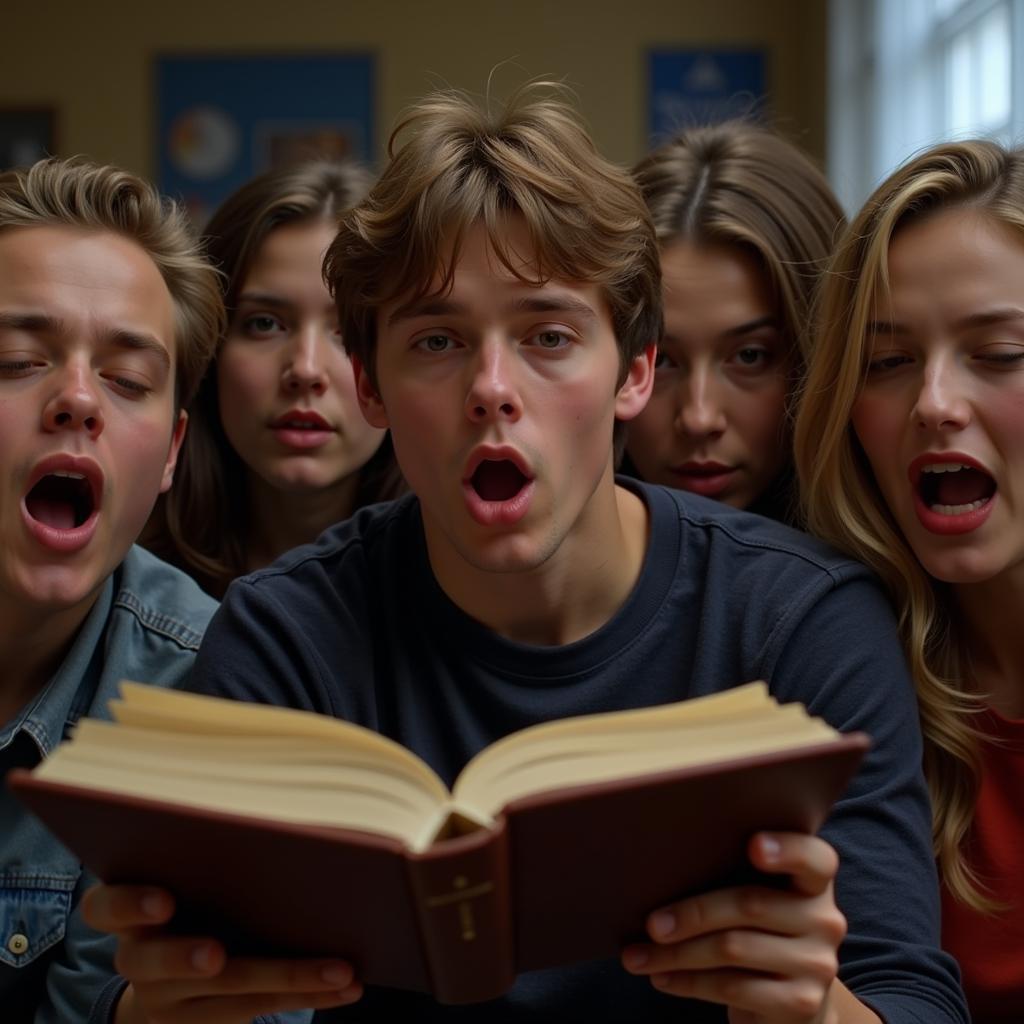The “Dead Poets Society,” a story etched into the hearts of many, often sparks debate about its rightful genre. While the film adaptation enjoys immense popularity, the book delves deeper into the narrative, revealing layers that extend beyond a simple categorization. So, what is the “Dead Poets Society” book genre? Let’s unpack this captivating tale and uncover its true literary identity.
 Students engrossed in books, mirroring a scene from "Dead Poets Society"
Students engrossed in books, mirroring a scene from "Dead Poets Society"
More Than Just a Coming-of-Age Story
The “Dead Poets Society” is often labeled as a coming-of-age story, and rightfully so. Set in an elite all-boys preparatory school, the narrative follows a group of teenagers navigating the complexities of adolescence, friendship, and self-discovery. The arrival of John Keating, their unconventional English teacher, ignites a passion for poetry and encourages them to challenge societal norms.
Through their journey, we witness the characters grapple with parental expectations, societal pressures, and the uncertainty of the future. The book beautifully portrays the turmoil and triumphs of youth, making it relatable to anyone who has experienced the bittersweet pangs of growing up.
 John Keating, the inspiring teacher, guiding his students in "Dead Poets Society"
John Keating, the inspiring teacher, guiding his students in "Dead Poets Society"
A Powerful Commentary on Education
Beyond the coming-of-age theme, “Dead Poets Society” offers a profound reflection on the education system. The book critiques the rigid and oppressive nature of traditional education, which often stifles creativity and independent thought. John Keating’s unorthodox methods, encouraging students to “seize the day” and “make your lives extraordinary,” challenge the very foundation of the school’s philosophy.
Through the contrasting approaches to education, the book raises essential questions about the purpose of learning, the role of educators, and the importance of nurturing individuality. It sparks a conversation about the need for an education system that fosters critical thinking, creativity, and a love for learning, rather than merely churning out conformists.
The Enduring Power of Poetry
Poetry, as the title suggests, plays a pivotal role in the narrative. The “Dead Poets Society,” a secret club where students gather to read and discuss poetry, becomes a sanctuary for self-expression and a catalyst for their transformation. The book beautifully weaves in excerpts from literary giants like Walt Whitman, Alfred Lord Tennyson, and Robert Frost, using their words to illuminate the characters’ inner struggles and aspirations.
More than just literary devices, these poems embody freedom, individuality, and the power of words to inspire and provoke. “Dead Poets Society” reminds us of the timeless relevance of poetry, its ability to transcend time and connect with human emotions across generations.
A Tapestry of Genres
So, what is the “Dead Poets Society” book genre? It’s a complex tapestry woven from threads of coming-of-age, social commentary, and a celebration of art and literature. It’s a story that defies easy categorization, resonating with readers on multiple levels.
While the film adaptation beautifully captures the essence of the story, the book provides a deeper dive into the characters’ psyches and the complexities of the themes explored. It’s a must-read for anyone who has ever questioned the status quo, dreamt of a life less ordinary, or found solace and inspiration in the power of words.
Conclusion: A Timeless Classic
The “Dead Poets Society” transcends genre conventions to deliver a timeless message about the importance of individuality, the pursuit of passion, and the power of art to inspire and transform. It’s a story that continues to resonate with readers of all ages, reminding us to “carpe diem” – seize the day – and live our lives to the fullest.
FAQs about “Dead Poets Society”
-
Is the book different from the movie? While the movie captures the essence of the story, the book delves deeper into the characters’ inner lives and explores the themes in greater detail.
-
What is the significance of the title? “Dead Poets Society” refers to a secret club where students gather to read and discuss poetry, symbolizing their rebellion against conformity and their embrace of art and individuality.
-
Why is “Dead Poets Society” considered a classic? The story’s timeless themes of individuality, passion, and the power of art continue to resonate with readers, making it a classic that transcends generations.
Need Help? Contact Us!
If you have any questions or need help exploring more thought-provoking stories like “Dead Poets Society,” our team at Society For Peace is here to assist you. Contact us at:
Phone: 02043854663
Email: [email protected]
Address: Khu 34, Bắc Giang, 260000, Việt Nam
Our dedicated customer support team is available 24/7 to assist you.